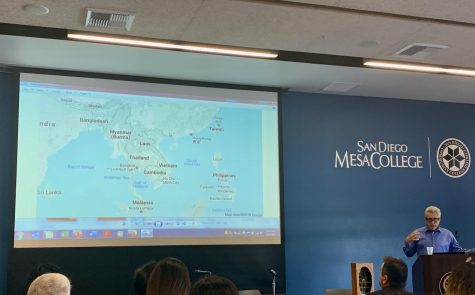During the week following Veterans Day, San Diego Mesa College hosted a panel discussion for students titled the “Chicano Experiences in Vietnam”. The Nov. 6 discussion panel was arranged to honor veterans, but also to discuss and dive into the Chicano/a community’s role in the Vietnam War. Held at the Mesa Commons building, the event took place early in the morning. Within an hour and a half of the event, the panelists discussed the lack of a narrative surrounding the Chicano/a community’s role in the Vietnam War as well as the effects battle has on a soldier coming home.
During the beginning of the panel, Professor César López, a professor in the Chicano/a Studies Department, gave a warm welcome to Vietnam veteran and UCSD Professor Jorge Mariscal and Mesa Professor MichaelOrnelas. Mariscal first spoke about his experience coming back from Vietnam and his views of patriotism quickly shifting. Before diving into the specific important components about the war, he said he was surprised to see social media posts about “the forgotten Chicano Vietnam Veterans”. According to Mariscal, “In social media now I’m noticing in the last few months people posting things about forgotten Chicano Vietnam veterans… I didn’t know we were still forgotten, but I guess we are, however, events like this will help.” Mariscal then explained that the atrocities and horrid scenes Chicanos witnessed in Vietnam changed many Chicano veterans’ patriotic views to be more anti-war and pacifistic like himself. While writing his book “Aztlán & Viet Nam: Chicano and Chicana Experiences of the War”, he was granted the opportunity to meet both sides of where people stood during the war. Professors Mariscal and Ornelas met veterans with stories about the war and anti-war activists who protested at the Chicano Moratorium during the summer of 1970. On Aug. 29th, 1970 the National Chicano Moratorium Committee lead an anti-war demonstration in East Los Angeles, which shortly led to a riot after police officers assaulted peaceful protesters.
The Vietnam War has been arguably the first war that drafted individuals based on class. “This is what scholars would call the working-class war. The vast majority of the Vietnam War were working class people of every color. That’s how we were plugged in.” said Mariscal. He made it a point in the panel to tell the audience that during the war there was not much leeway in escaping the draft, so there was a feeling of constant wariness in American culture. Unless a draftee were rich enough to get their attorney to write a medical letter, there wasn’t a way of getting out of the war. Thus, there wasn’t much choice for their generation. Another issue Mariscal brought to light were the intricacies of the war, such as the cruelty noncombatants experienced, but also the humanity some soldiers showed towards civilians. Mariscal then explained, “The story I told you about My Lai where some men killed women and children and other men on the same side were trying to save women and children. So that is the complexity of war situations, especially in combat.”
Professor Ornelas made an important point that there are different ways to show true patriotism besides joining the military. Ornelas noted, “There’s a lot of ways to express patriotism. You’re doing it by being here at Mesa College, working hard, transferring and becoming a professional. Helping your own family… that’s building a country, that’s patriotic also. You don’t have to carry a gun, carry a pen, hm?” Ornelas has been an anti-war activist since he was a teenager witnessing his friends being drafted into the war. He recalled a crucial memory about his friend Rudy that shaped his perspective about the war and respect for veteran. Ornelas described his friend’s perplexed feelings about his experience in the Vietnam war. His friend Rudy served in the way and had a difficult time making sense of what happened during the war, leaving him with mixed feelings in general. One day Rudy told Ornelas, “I heard the national anthem today, I cried, I don’t know why.” One of the things Ornelas learned while writing “The Sons of Guadalupe” is that Chicano veterans or veterans in general need psychological help or discuss their experiences rather than bury them.
After an hour and a half of the discussion, the panelists stayed for another fifteen minutes for Q&A session for the audience. Questions typically pertained to family members dealing with traumatic pasts and their thoughts about the Iraq War currently. One former Mesa student and Afghanistan veteran stood up to relay his struggles with education, consequently making his decision to join the military. This was a vital issue that lead veterans to be drafted and placed with infantrymen during the Vietnam War as well. The Iraq War veteran informed Mariscal that he had heard one of his high school teachers in the past state in vulgar language that veterans had a reputation of having low intelligence. He asked Mariscal what his thoughts were on these negative generalizations. Mariscal responded with, “There is an odd anti-veteran discourse that’s gotten worse in the last couple years. There is a reoccurring thing of ‘thank you for yourself, we honor veterans’, but there are other people undercutting us. Even your generation who don’t deserve it, obviously.” The Q&A ended there with an applause in response to Mariscal’s statement and what felt like overall respect towards veterans.

